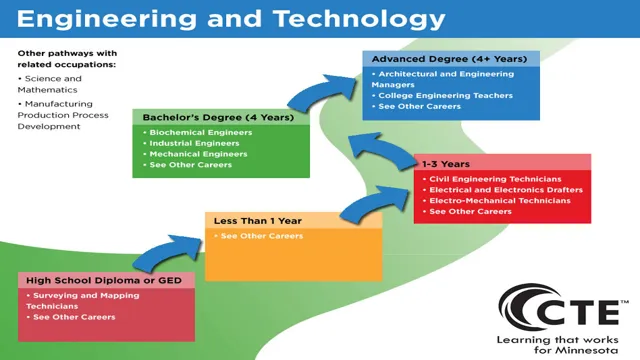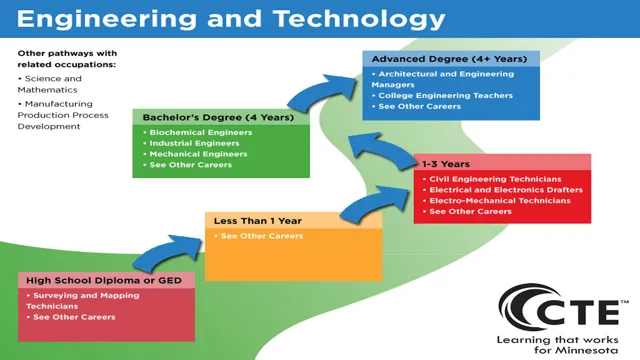Lighting up your Future: Exploring Lucrative Career Paths for Electrical Engineering Technology
Electricity is one of the key resources that we rely on for almost everything in our daily lives. Electrical Engineering Technology (EET) is an exciting and lucrative field that is constantly evolving with new technologies. It can lead to a broad range of career opportunities, including designing, building, and maintaining electrical systems.
In this blog, we will explore the various career paths for electrical engineering technology professionals. Are you interested in a career that offers a challenging, high-tech environment with good job prospects and a promising career outlook? Then read on as we delve into the exciting world of EET.
What is Electrical Engineering Technology?
There are numerous career paths available for those skilled in electrical engineering technology. These professionals are responsible for designing, developing, testing, and maintaining electrical systems and equipment used in various industries. Some common career paths in this field include electrical and electronics engineering technicians, electricians, telecommunications specialists, and power plant operators.
In addition, many electrical engineering technology professionals work in the renewable energy sector, designing and installing solar and wind energy systems. With an ever-increasing demand for sustainable energy solutions, this field is ripe with opportunities for those with a passion for innovation and problem-solving. Whether you prefer to work in telecommunications, manufacturing, energy production, or a related field, pursuing a career in electrical engineering technology can open up a world of possibilities.
Overview of Job Description
Electrical Engineering Technology Electrical engineering technology is a field of engineering that focuses on the practical application of electrical principles. It involves the design, development, and maintenance of electrical systems and components such as power generators, transformers, motors, and communication systems. Electrical engineering technology also involves the use of electronics in various applications, such as in the design of integrated circuits for computers and other digital devices.
Engineers with this expertise use their knowledge of electrical systems to help solve real-world problems and improve existing technology. They work closely with electrical engineers and other professionals to create innovative solutions and improve the efficiency and safety of electrical systems. If you’re passionate about technology and have a strong interest in electrical systems, a career in electrical engineering technology may be a great fit for you.

Key Skills Requirements
Electrical Engineering Technology is a field that deals with the application of electrical principles and technologies to design, develop, test, and maintain electronic systems. The field combines theoretical knowledge from the traditional electrical engineering field with practical skills required in the industrial setting. Individuals in this field are tasked with developing technological solutions to various problems in a wide range of industries, including manufacturing, telecommunications, energy, healthcare, and transportation.
Key skills required to succeed in this field include analytical thinking, technical problem-solving abilities, and attention to detail. Electrical Engineering Technologists should also possess good communication skills and the ability to work collaboratively with other professionals in their field. Additionally, proficiency in computer programming and design software is highly beneficial as it enables technologists to design systems and analyze data accurately.
Career Opportunities for Electrical Engineering Technology Graduates
If you’re considering a career in electrical engineering technology, there are many paths you can take after graduation. One option is to work as an electronics engineering technician, where you’ll be responsible for designing, testing, and maintaining electronic equipment and systems. Another possibility is to become an electrical drafter, where you’ll create technical drawings and plans for wiring and electrical systems.
If you prefer a more hands-on approach, you could work as an electrician or electrical installer, where you’ll be responsible for installing, repairing, and maintaining electrical systems on a daily basis. Additionally, you could pursue a career in automation technology, where you’ll design and install automated systems and machinery for industrial or commercial use. The possibilities are endless when it comes to career options for electrical engineering technology graduates, so it’s important to consider your strengths and interests before choosing a path to pursue.
Whether you’re interested in working in a lab or out in the field, there’s a career for you in this dynamic and ever-growing field.
Electronics Engineering Technician
As an Electronics Engineering Technician, there are numerous career opportunities waiting for you after graduating from Electrical Engineering Technology. Firstly, you can choose to work in the manufacturing industry, where you’ll be in charge of creating, designing, testing, and optimizing electronic products. With the developing world, the demand for electronics keeps on increasing, and you can be a part of fulfilling that need by working as an electronics engineering technician.
Moreover, you can work for an electronics company to develop special electronic equipment for other businesses or individuals. Another opportunity lies in the field of research and development where you can work with a team of engineers to develop new electronic technologies and study ways to make current electronic devices work more efficiently. Besides, you can work in the automotive and aviation industries where the use of electronics is vast.
As an electronics engineering technician, you would develop and maintain the electronic systems in automobiles and aircraft. Furthermore, you can venture into the renewable energy sector and work with green energy technology by designing, developing or improving the electronic systems used in solar panels, wind turbines, or hydroelectric plants. In conclusion, various opportunities can come your way after completing an Electrical Engineering Technology program.
As technology keeps on advancing, the demand for electronics technicians will keep on increasing, making it a rewarding and fulfilling career choice.
Automation Engineer
As an Automation Engineer, a career path that is open to graduates of Electrical Engineering Technology, there are many opportunities available in today’s job market. These professionals are skilled in the development, deployment, and maintenance of industrial control systems used in a range of industries, from manufacturing to healthcare and beyond. With the global push for greater efficiency and automation, there is a growing demand for Automation Engineers who can design and implement systems that save time and money while improving productivity and reducing waste.
Additionally, the rise of the Internet of Things (IoT) and smart factories has created even more opportunities for these skilled professionals. An Automation Engineer may work on projects that involve coding and software development, instrumentation and control system design, system testing and commissioning, and more. They may also be involved in troubleshooting and technical support to ensure that systems are running at optimal levels.
With so much flexibility in terms of industries and projects, it’s no wonder that Electrical Engineering Technology graduates are highly sought after for these dynamic and rewarding roles.
Electrical Drafter
As an Electrical Drafter, you can embark on a fulfilling career journey by enrolling in an Electrical Engineering Technology program. This degree program equips aspirants with the technical skills, knowledge, and practical expertise necessary to excel in the industry. Graduates of this program can thrive in a wide range of career options, including Electrical Drafters.
As an Electrical Drafter, you’ll be responsible for creating and preparing technical drawings and plans used in the construction and manufacturing of electrical equipment and system installations. From power generation and transmission to communication systems and circuit designs, an Electrical Drafter’s role plays a critical part in the successful implementation of electrical projects. As the world continues to expand technologically, the demand for Electrical Drafters is expected to grow, making this a promising career path for aspiring electrical engineers.
By proactively developing and honing your skills, you can achieve great success in the industry while contributing to the betterment of society.
Advanced Career Paths for Electrical Engineering Technology Professionals
If you’re an electrical engineering technology professional looking to take your career to the next level, there are a range of advanced career paths available to you. One such path is becoming a certified project management professional (PMP), which can open up opportunities to lead complex projects and teams within your organization. Additionally, if you’re interested in teaching or consulting, pursuing a PhD in electrical engineering technology can provide the necessary education and credentials to do so.
Another option is to specialize in a particular area of the field, such as mechatronics or power systems, and become an expert in that area. No matter which path you choose, continuing education and staying up-to-date with the latest advances in the field will be crucial to your success. So, whether you’re a recent graduate just starting out or an experienced professional looking for a new challenge, there are plenty of exciting career paths to explore in electrical engineering technology.
Technical Lead
As an Electrical Engineering Technology professional, there are various advanced career paths to consider, with one of them being the role of a Technical Lead. This position requires strong technical skills and experience in leading a team of engineers to develop and execute high-quality projects. As a Technical Lead, you will be responsible for identifying technical requirements and providing recommendations on the best solutions that align with the organization’s goals.
You will also need to possess excellent communication and management skills to ensure that your team members are motivated and aligned with the project objectives. This role provides an opportunity to lead and contribute to the development of innovative solutions, and it is also financially rewarding. Therefore, investing time and effort into developing technical skills and management expertise is crucial to excel and advance in this career path.
Project Manager
Electrical Engineering Technology, Advanced Career Paths, Project Manager As electrical engineering technology professionals advance in their careers, they may consider pursuing more advanced career paths, such as becoming a project manager. In this role, they would be responsible for leading a team in the planning, execution, and completion of complex projects. This could include everything from building infrastructure to developing new software.
With their expertise in electrical engineering technology, project managers can ensure that each project’s technical aspects are completed to the highest standard. Additionally, they must have strong communication and leadership skills to ensure all team members understand their roles and responsibilities. A project manager’s job is challenging, but it offers excellent opportunities for growth and advancement in the industry.
Conclusion
In conclusion, pursuing a career in electrical engineering technology is like being a superhero in the world of technology. You get to design, develop, and implement cutting-edge solutions that power industries and transform the way we live and work. Whether you choose to specialize in power systems, telecommunications, automation, or any other field, you’ll be playing a critical role in shaping the future of our digital world.
So if you’re looking for a career path that combines creativity, innovation, and problem-solving, look no further than electrical engineering technology. Trust us, it’s shockingly rewarding!”
FAQs
What are the different career paths for electrical engineering technology graduates?
Electrical engineering technology graduates can pursue careers in various industries such as power generation and distribution, telecommunications, manufacturing, automotive, aerospace, and defense. They can work in positions like electrical engineers, electronics technicians, systems analysts, control systems engineers, and communication systems specialists.
What skills are required for a career in electrical engineering technology?
Some of the critical skills that are required for a successful career in electrical engineering technology are proficiency in math, physics, and computer programming, excellent analytical and problem-solving abilities, a strong attention to detail, an ability to work independently or as part of a team, and excellent communication and interpersonal skills.
What is the average salary for electrical engineering technology professionals?
The average salary for electrical engineering technology professionals varies depending on the industry, location, and experience level. The average salary for entry-level professionals is around $60,000 per year, while experienced professionals can earn salaries of up to $120,000 per year.
What are some of the emerging trends in electrical engineering technology?
Some of the emerging trends in electrical engineering technology include renewable energy systems, electric and hybrid vehicles, smart grids, automation and control systems, artificial intelligence, and the Internet of Things (IoT). Professionals in this field must stay up-to-date with the latest technologies and trends to remain competitive in the job market.






